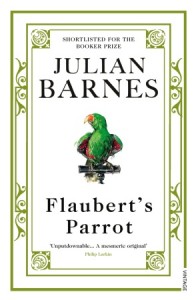 My copy of 1001 Books You Must Read Before You Die characterizes Julian Barnes’s Flaubert’s Parrot as such: “This is a fascinating jigsaw puzzle of a book.” And while it’s not an untrue statement, it’s also a little dismissive of what I feel is the real, true accomplishment of this novella — Barnes’s complete ability to broadly reimagine the constructs of the “novel.” In a way, if you were reading critically, you could define the book in so many different ways: a post-modern collection speaking back to one of the greats of Western literature, Flaubert; a finely tuned, self-referential critique of the Ivory Tower nature of literary history and criticism; a highly personal story of a man (a doctor) relating so deeply to a story and characters (in Madame Bovary) that it allows him the space to come to terms with the state of his own life; and the more you read it, the more you see in it — that’s the utter brilliance of this work.
My copy of 1001 Books You Must Read Before You Die characterizes Julian Barnes’s Flaubert’s Parrot as such: “This is a fascinating jigsaw puzzle of a book.” And while it’s not an untrue statement, it’s also a little dismissive of what I feel is the real, true accomplishment of this novella — Barnes’s complete ability to broadly reimagine the constructs of the “novel.” In a way, if you were reading critically, you could define the book in so many different ways: a post-modern collection speaking back to one of the greats of Western literature, Flaubert; a finely tuned, self-referential critique of the Ivory Tower nature of literary history and criticism; a highly personal story of a man (a doctor) relating so deeply to a story and characters (in Madame Bovary) that it allows him the space to come to terms with the state of his own life; and the more you read it, the more you see in it — that’s the utter brilliance of this work.
The first chapter sets out a premise. Geoffrey Braithewaite, an amateur Flaubert scholar, stumbles upon a mystery involving two stuffed parrots and it starts him off on a journey deep into the writer’s life. Interspersed within his discoveries are tales of the writer’s affairs, opinions by an ex-lover, some strange actions by a disgraced scholar, and a wonderful, masterful chapter where Geoffrey explains the true essence of his obsession — he’s a retired doctor; his wife took lovers.
I could not put this book down and even though there’s very little “novel” to the novel, the writing, as is with all of Barnes’s work, is impeccable. Sharp, detailed, witty, engaging and compelling. To try and fit in too many adjectives might defeat the purpose and put me in the ranks of the other critics the narrative so disparages; so, I’ll leave it there.